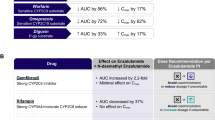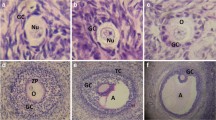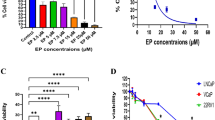Abstract
Purpose: The overall purpose of this study was to determine the potential usefulness of 1,19-di-(ethylamino)-5,10,15-triazononadecane (BE-4-4-4-4) in the treatment of prostate cancer using in vitro and in vivo models. More specifically the objectives were: (1) to determine the in vitro and in vivo sensitivity of human and rat prostate cancer cells to two polyamine analogues N 1,N 11-di(ethyl)norspermine (DENSPM) and BE-4-4-4-4; (2) to determine whether the mechanism of cell kill occurred through an apoptotic pathway; and (3) to determine the toxicity associated with therapeutic doses of BE-4-4-4-4 using an animal model. Methods: In order to determine the ability of these drugs to cause in vitro cytotoxicity, colony-forming assays were performed utilizing the well-characterized Dunning rat prostate cancer cell lines AT3.1, AT6.1 and AT6.3, and the androgen-insensitive human prostate cancer cell lines DU145, DuPro-1 and TSU-Pr1. Apoptotic cell death was determined using DNA laddering and DAPI staining of nuclei. The antitumor activity of BE-4-4-4-4 was evaluated by treatment of DuPro-1 and PC-3 xenograft tumors in nude mice. Results: BE-4-4-4-4 was shown to be approximately 4 to 86 times more cytotoxic in clonogenic assays than DENSPM in both rat and human prostate carcinoma cell lines. Cells treated with cytotoxic doses of DENSPM or BE-4-4-4-4 showed no signs of apoptosis using either DNA laddering or DAPI staining of nuclei. There was a significant inhibition of DuPro-1 tumors for animals treated with BE-4-4-4-4 compared with control animals. Equitoxic doses of BE-4-4-4-4 resulted in greater tumor inhibition than DENSPM, although the difference was not significant. After treatment with therapeutic doses of BE-4-4-4-4, histopathologic evaluation indicated minimal to mild necrosis and inflammation in the kidneys on days 15 and 22 following treatment. On day 35, there was no necrosis or regeneration present in the kidney, indicating that the toxicity was transient and that regeneration of epithelial cells was complete with apparent return to normalcy. Conclusions: These initial studies demonstrate that BE-4-4-4-4 is cytotoxic against rat and human prostate cancer cells in culture and effective against DuPro-1 xenografts in nude mice. Polyamine analogues, such as DENSPM or BE-4-4-4-4, should be considered for clinical use in the treatment of prostate adenocarcinomas.
Similar content being viewed by others
Author information
Authors and Affiliations
Additional information
Received: 5 February 1997 / Accepted: 11 September 1997
Rights and permissions
About this article
Cite this article
Zagaja, G., Shrivastav, M., Marton, L. et al. Effects of polyamine analogues on prostatic adenocarcinoma cells in vitro and in vivo. Cancer Chemother Pharmacol 41, 505–512 (1998). https://doi.org/10.1007/s002800050774
Issue Date:
DOI: https://doi.org/10.1007/s002800050774




